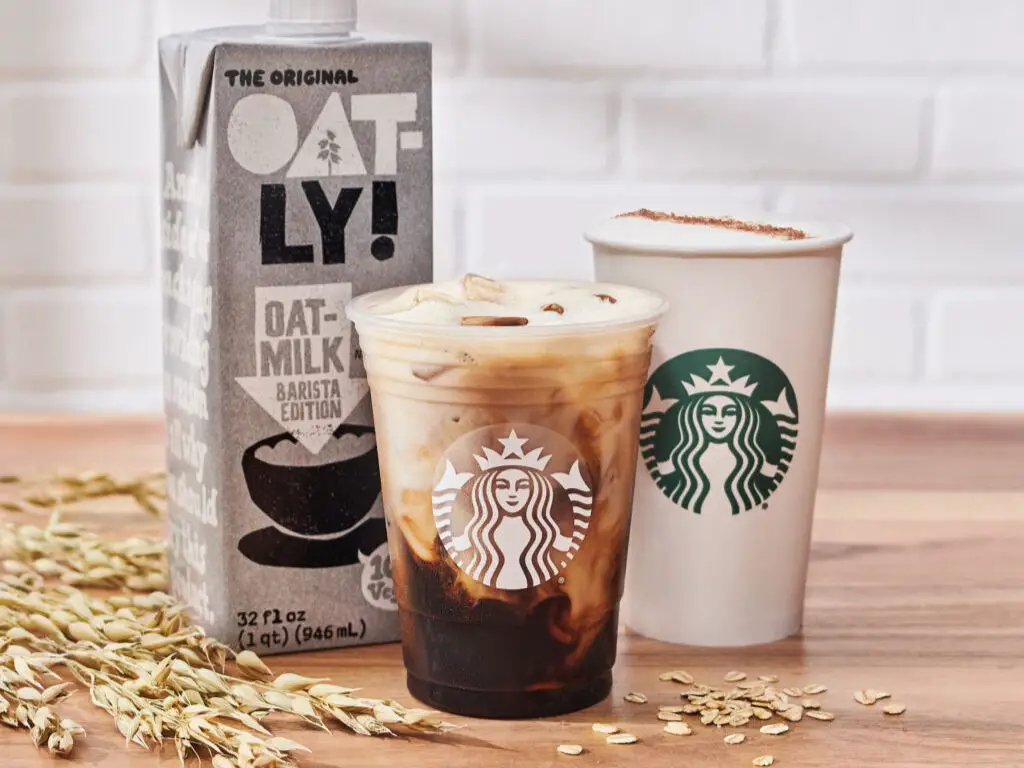Starbucks Oat Milk is a vegan alternative to dairy milk that has recently become a popular choice for coffee drinkers and those looking for a healthier option. It’s made from oats, water, and salt and is free from dairy, soy, and other common allergens. It has a creamy texture and a mild flavor that makes it ideal for adding to coffee drinks or using in recipes.
In this article, we’ll explore the history of Starbucks Oat Milk, its nutritional information, taste, health benefits, versatility in recipes, cost-effectiveness, environmental impact, pros and cons, and more.

History of Starbucks Oat Milk
Starbucks Oat Milk was first introduced in 2020 as part of the company’s commitment to offering more sustainable and plant-based options. This new product quickly became popular among both vegans and non-vegans alike due to its smooth texture and subtle flavor. The oat milk is now available in all Starbucks locations across the United States.
Nutritional Information
Starbucks Oat Milk is low in calories with only 30 per 8-ounce serving. It also contains 4 grams of fat, 0 grams of cholesterol, 5 grams of carbohydrates, and 0 grams of sugar. Additionally, it provides 2 grams of protein per serving which makes it an excellent source of plant-based protein.
Taste and Texture
Starbucks Oat Milk has a creamy texture that is similar to traditional dairy milk but without the added fat or cholesterol. It has a mild flavor with hints of oats that make it perfect for adding to coffee drinks or using in recipes such as oatmeal or smoothies.
Health Benefits
Starbucks Oat Milk is an excellent source of plant-based protein which can help to support muscle growth and repair as well as provide energy throughout the day. Additionally, it contains no cholesterol or saturated fat which can help to reduce the risk of heart disease and other health issues associated with high levels of these substances in the diet.
Versatility in Recipes
Starbucks Oat Milk can be used as an ingredient in a variety of recipes such as oatmeal, smoothies, pancakes, waffles, muffins, cakes, cookies and more! It’s also great for making creamy soups or sauces that don’t require any additional dairy products.
Cost-Effectiveness
Starbucks Oat Milk is an affordable option compared to other plant-based milks on the market today. A 32-ounce carton costs around $5 which makes it an economical choice for those looking for a vegan alternative to traditional dairy milk without breaking the bank.
Environmental Impact of Starbucks Oat Milk
The production process for Starbucks Oat Milk is relatively sustainable compared to other plant-based milks on the market today due to its minimal water usage during manufacturing processes as well as its recyclable packaging materials which can be reused multiple times before being discarded properly into landfills or composting sites instead of ending up in our oceans or other bodies of water where they could cause pollution or harm wildlife habitats.
Pros and Cons of Starbucks Oat Milk
There are some pros and cons associated with drinking Starbucks Oat Milk that should be taken into consideration before making it part of your daily routine:
Pros: Low calorie content; no cholesterol or saturated fat; high source of plant-based protein; affordable price; eco-friendly production process; versatile uses in recipes; mild flavor profile; creamy texture; no need for refrigeration until opened; shelf life up to 7 days after opening (refrigerated).
Cons: Not suitable for those with allergies or intolerances to oats; not suitable for baking due to lack of stability when heated; not suitable for those who are lactose intolerant due to presence of traces amounts lactose from oats used in production process; not suitable for those who require calcium supplementation (contains only small amounts).
Conclusion
In conclusion, Starbucks Oat Milk is an excellent vegan alternative to traditional dairy milk that offers many health benefits including a low calorie content, no cholesterol or saturated fat content, high source of plant-based protein, affordability compared to other plant-based milks on the market today as well as an eco-friendly production process with recyclable packaging materials that can be reused multiple times before being discarded properly into landfills or composting sites instead of ending up in our oceans or other bodies of water where they could cause pollution or harm wildlife habitats.
Additionally, it has a mild flavor profile with hints of oats that make it perfect for adding to coffee drinks or using in recipes such as oatmeal or smoothies without sacrificing taste or texture!
